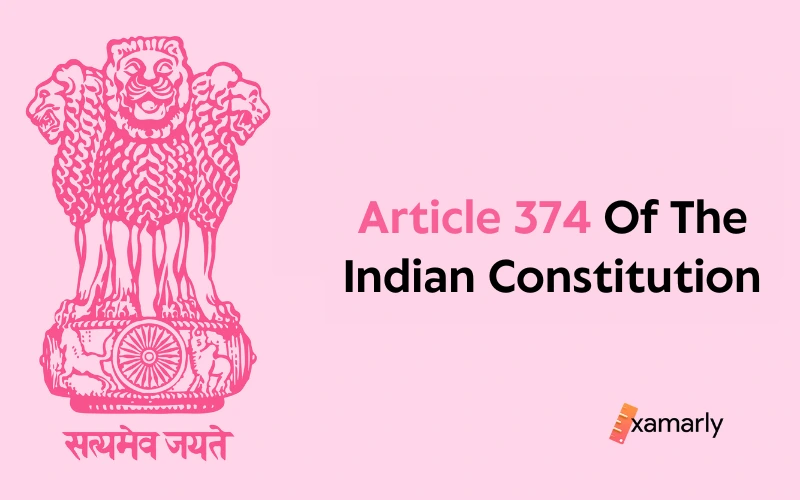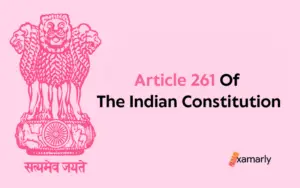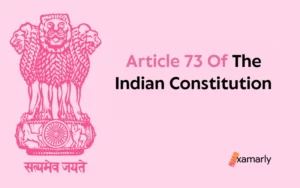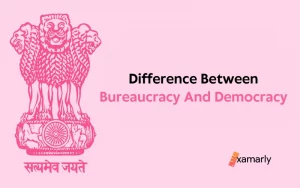An Overview
The Indian Constitution is a document that lays down the fundamental principles and laws that govern the country. One of the key articles is Article 374 of the Indian Constitution, which deals with the provisions related to the Judges of the Federal Court and the proceedings pending in the Federal Court or before His Majesty in Council.
Article 374 plays an important role in ensuring the smooth transition of the legal system from the Federal Court to the Supreme Court.
In this blog, we will take a closer look at the provisions of Article 374 and understand its significance in the Indian legal system. We will also explore how it allows Judges of the Federal Court to continue their service as Judges of the Supreme Court and how it ensures that any ongoing legal proceedings are smoothly transferred to the Supreme Court for resolution.
- An Overview
- What Is Article 374 Of The Indian Constitution All About?
- Background Of Article 374 Of The Indian Constitution
- Clause (1) Of Article 374 Of The Indian Constitution: Explained
- Clause (2) Of Article 374 Of The Indian Constitution: Explained
- Clause (3) Of Article 374 Of The Indian Constitution: Explained
- Clause (4) Of Article 374 Of The Indian Constitution: Explained
- Clause (5) Of Article 374 Of The Indian Constitution: Explained
- Summing Up
- FAQs Related To Article 374 Of The Indian Constitution
- Which Chapter Of The Constitution Of India Does Article 374 Of The Indian Constitution Fall Under?
- Can The Orders Made Under Article 374 Of The Indian Constitution Be Modified?
- What Provisions Does Article 374 Of The Indian Constitution Make For The Transition Of Judges From The Federal Court To The Supreme Court?
- What Happens To Proceedings Pending In The Federal Court Or Before His Majesty In Council According To The Indian Constitution?
- What Does The Second Clause Of Article 374 Of The Indian Constitution Deal With?
- What Is The Authority Of The Supreme Court Over The Transferred Cases From The Federal Court?
- Will The Judgments Or Orders Made By The Federal Court Before The New Constitution Takes Effect Still Be Valid?
What Is Article 374 Of The Indian Constitution All About?
Under Article 374 of the Indian Constitution, the Constitution of India provides for provisions with respect to the Judges who are a part of the Federal Court. It also holds provisions for the proceedings pending in the Federal Court or before His Majesty in Council.
Any proceedings pending in the Federal Court or before His Majesty in Council shall be transferred to the Supreme Court and shall be disposed of by the Supreme Court as if they had been pending before it. This means that the Judges of the Federal Court were allowed to continue their service as Judges of the Supreme Court and any ongoing legal proceedings in the Federal Court or before His Majesty in Council were transferred to the Supreme Court to be resolved.
Background Of Article 374 Of The Indian Constitution
Let us first take a look at the background of Article 374 of the Indian Constitution.
- On October 10, 1949, the Constituent Assembly had a discussion over Draft Article 308. This Draft Article would later become Article 374 of the Constitution of India.
- Draft Article 308, in its revised form, was included in the final version of the Constitution. This was done after being approved by the Chairman of the Drafting Committee. It was done on October 10, 1949.
Clause (1) Of Article 374 Of The Indian Constitution: Explained
(1) The Judges of the Federal Court holding office immediately before the commencement of this Constitution shall, unless they have elected otherwise, become on such commencement the Judges of the Supreme Court and shall thereupon be entitled to such salaries and allowances and to such rights in respect of leave of absence and pension as are provided for under article 125 in respect of the Judges of the Supreme Court.
The first clause of Article 374 of the Indian Constitution talks about the transition of Judges from the Federal Court to the Supreme Court at the commencement of a new constitution. It states that the Judges who were holding office in the Federal Court immediately before the new constitution takes effect will automatically become Judges of the Supreme Court unless they choose not to. These Judges will then be entitled to the same salaries, allowances, and rights regarding leave of absence and pension as the Judges who were already serving on the Supreme Court, as specified in Article 125 of the Indian Constitution.
Clause (2) Of Article 374 Of The Indian Constitution: Explained
(2) All suits, appeals and proceedings, civil or criminal, pending in the Federal Court at the commencement of this Constitution shall stand removed to the Supreme Court, and the Supreme Court shall have jurisdiction to hear and determine the same, and the judgments and orders of the Federal Court delivered or made before the commencement of this Constitution shall have the same force and effect as if they had been delivered or made by the Supreme Court.
The second clause of this article revolves around the transfer of cases from the Federal Court to the Supreme Court at the commencement of a new constitution. It states that all pending cases, whether they are civil or criminal, that were being heard in the Federal Court at the time the new constitution takes effect will be transferred to the Supreme Court.
The Supreme Court will then have the authority to hear and make decisions on these cases. Additionally, any judgments or orders that were made by the Federal Court before the new constitution takes effect will still be valid and have the same legal force as if they had been made by the Supreme Court.
Clause (3) Of Article 374 Of The Indian Constitution: Explained
(3) Nothing in this Constitution shall operate to invalidate the exercise of jurisdiction by His Majesty in Council to dispose of appeals and petitions from, or in respect of, any judgment, decree or order of any court within the territory of India in so far as the exercise of such jurisdiction is authorised by law, and any order of His Majesty in Council made on any such appeal or petition after the commencement of this Constitution shall for all purposes have effect as if it were an order or decree made by the Supreme Court in the exercise of the jurisdiction conferred on such Court by this Constitution.
The third clause of Article 374 brings into discussion the jurisdiction of His Majesty in Council, which is a legal body in the United Kingdom that is responsible for appeals and petitions from, or in relation to, courts within the territory of India.
The clause states that nothing in the Constitution of India shall negate or invalidate the jurisdiction of His Majesty in Council to hear and dispose of these appeals and petitions, as long as the exercise of such jurisdiction is authorized by law.
Additionally, any order or decision made by His Majesty in Council on these appeals or petitions will be considered as if it were made by the Supreme Court of India, which is the highest court of the land and has the jurisdiction to hear and decide on these types of cases.
Clause (4) Of Article 374 Of The Indian Constitution: Explained
(4) On and from the commencement of this Constitution the jurisdiction of the authority functioning as the Privy Council in a State specified in Part B of the First Schedule to entertain and dispose of appeals and petitions from or in respect of any judgment, decree or order of any court within that State shall cease, and all appeals and other proceedings pending before the said authority at such commencement shall be transferred to, and disposed of by, the Supreme Court.
Clause (4) of Article 374 of the Indian Constitution highlights the jurisdiction of the Privy Council in certain States of India that are specified in Part B of the First Schedule of the Indian Constitution.
The clause states that upon the commencement of the Constitution, the authority of the Privy Council to hear and dispose of appeals and petitions from or in relation to any judgment, decree or order of any court within that state shall be terminated.
In addition to this, all appeals and other legal proceedings that were pending before the Privy Council at the time of the commencement of the Constitution will be transferred to and disposed of by the Supreme Court of India. This means that the Privy Council will no longer have the authority to hear appeals and petitions from the specified States and the Supreme Court will be the only court that has the power to hear and decide on these types of cases.
Clause (5) Of Article 374 Of The Indian Constitution: Explained
(5) Further provision may be made by Parliament by law to give effect to the provisions of this article.
The final clause of this article states that additional provisions may be made by the Parliament of India through legislation to implement or carry out the provisions of the article that this provision is a part of.
It means that the article itself may not provide all the necessary details for its implementation, so additional laws or regulations may need to be passed by the Parliament of India to ensure that the provisions of the article are fully effective. This may include clarifying certain aspects of the article, providing for specific procedures, or specifying penalties for noncompliance, among other things.
You Might Also Like:
| Article 372 Of The Indian Constitution | Article 373 Of The Indian Constitution |
| Article 375 Of The Indian Constitution | Article 379 Of The Indian Constitution |
Summing Up
After gaining a thorough understanding of Article 374 of the Indian Constitution, we can conclude the following:
- Article 374 of the Indian Constitution deals with the transition of Judges from the Federal Court to the Supreme Court at the time of the new constitution. It states that the Judges holding office in the Federal Court immediately before the new constitution takes effect will automatically become Judges of the Supreme Court unless they choose not to.
- These judges will be entitled to the same salaries, allowances, rights regarding leave of absence and pension as the judges who were already serving on the Supreme Court, as specified in Article 125 of the Indian Constitution.
- The provision of the article also includes the transfer of cases from the Federal Court to the Supreme Court at the commencement of a new constitution, where all pending cases in the Federal Court will be transferred to the Supreme Court and the Supreme Court will have the authority to hear and make decisions on those cases.
- Nothing in the Constitution of India shall negate or invalidate the jurisdiction of His Majesty in Council to hear and dispose of these appeals and petitions, as long as the exercise of such jurisdiction is authorized by law.
- Any order or decision made by His Majesty in Council on these appeals or petitions will be considered as if it were made by the Supreme Court of India.
- It states that upon the commencement of the Constitution, the authority of the Privy Council to hear and dispose of appeals and petitions from or in relation to any judgment, decree or order of any court within that state shall be terminated.
- All appeals and other legal proceedings pending before the Privy Council at the time of the commencement of the Constitution will be transferred to and disposed of by the Supreme Court of India.
- The final clause of this article allows additional provisions to be made by the Parliament of India through legislation to implement or carry out the provisions of the article.
FAQs Related To Article 374 Of The Indian Constitution
Which Chapter Of The Constitution Of India Does Article 374 Of The Indian Constitution Fall Under?
Article 374 of the Indian Constitution falls under Chapter XXI of the Constitution of India. The chapter contains articles dealing with temporary, transitional, and special provisions.
Can The Orders Made Under Article 374 Of The Indian Constitution Be Modified?
Yes, any order made under Article 374 shall be laid before each House of Parliament and shall be subject to such modifications as Parliament may make during the session in which it is so laid or the session immediately following.
What Provisions Does Article 374 Of The Indian Constitution Make For The Transition Of Judges From The Federal Court To The Supreme Court?
According to the Indian Constitution, the Judges who were holding office in the Federal Court immediately before the new constitution takes effect will automatically become Judges of the Supreme Court unless they choose not to. These Judges will then be entitled to the same salaries, allowances, and rights regarding leave of absence and pension as the Judges who were already serving on the Supreme Court, as specified in Article 125 of the Indian Constitution.
What Happens To Proceedings Pending In The Federal Court Or Before His Majesty In Council According To The Indian Constitution?
Any proceedings pending in the Federal Court or before His Majesty in Council shall be transferred to the Supreme Court and shall be disposed of by the Supreme Court as if they had been pending before it.
What Does The Second Clause Of Article 374 Of The Indian Constitution Deal With?
The second clause of Article 374 of the Indian Constitution deals with the transfer of cases from the Federal Court to the Supreme Court at the commencement of a new constitution. It states that all pending cases, whether they are civil or criminal, that were being heard in the Federal Court at the time the new constitution takes effect will be transferred to the Supreme Court.
What Is The Authority Of The Supreme Court Over The Transferred Cases From The Federal Court?
According to the second clause of Article 374, the Supreme Court will have the authority to hear and make decisions on the cases that were transferred from the Federal Court.
Will The Judgments Or Orders Made By The Federal Court Before The New Constitution Takes Effect Still Be Valid?
Yes, any judgments or orders that were made by the Federal Court before the new constitution takes effect will still be valid and have the same legal force as if they had been made by the Supreme Court.






